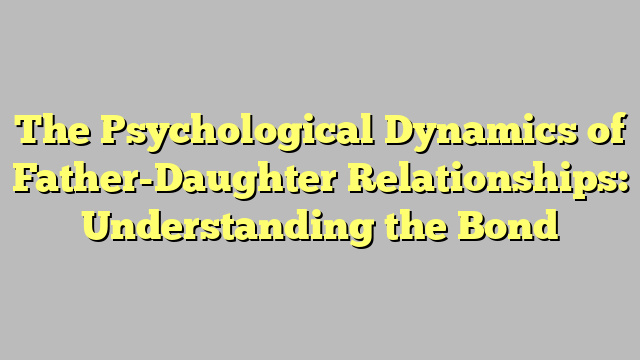The Psychological Dynamics of Father-Daughter Relationships: Understanding the Bond
The Psychological Dynamics of Father-Daughter Relationships: Understanding the Bond
Father-daughter relationships are complex and multifaceted, shaped by a variety of psychological dynamics that influence the bond between a father and his daughter. Understanding these dynamics can provide insight into the unique nature of this relationship and the impact it has on both individuals involved.
Psychological Dynamics
There are several key psychological dynamics at play in father-daughter relationships, including:
- Attachment
- Role modeling
- Communication
- Emotional support
- Identity development
Each of these dynamics plays a crucial role in shaping the bond between a father and his daughter, and understanding them can help to shed light on the complexities of this relationship.
Attachment
Attachment theory suggests that the quality of a child’s early attachment to their primary caregiver, often their father, can have a significant impact on their emotional and psychological development. A secure attachment to a father figure can provide a sense of safety and security, while an insecure attachment can lead to feelings of anxiety and mistrust.
Role Modeling
Fathers often serve as important role models for their daughters, shaping their beliefs, values, and behaviors. A father’s influence can impact a daughter’s self-esteem, body image, and attitudes towards relationships and success. Positive role modeling can have a lasting impact on a daughter’s development, while negative role modeling can lead to challenges and difficulties.
Communication
Effective communication is essential for building a strong and healthy father-daughter relationship. Open and honest communication can foster trust, understanding, and connection, while poor communication can lead to misunderstandings, conflict, and distance. Fathers who are able to communicate openly and effectively with their daughters can help to strengthen their bond and support their emotional well-being.
Emotional Support
Fathers play a crucial role in providing emotional support and validation for their daughters. Emotional support from a father can help a daughter develop a strong sense of self-worth and resilience, while a lack of emotional support can lead to feelings of insecurity and inadequacy. Fathers who are emotionally available and supportive can have a positive impact on their daughter’s mental and emotional well-being.
Identity Development
As daughters navigate the process of identity development, their relationship with their father can play a significant role in shaping their sense of self. A father’s influence can impact a daughter’s self-concept, self-esteem, and confidence, as well as her beliefs about her worth and capabilities. Fathers who support and affirm their daughters’ identities can help them develop a strong and positive sense of self.
Understanding the Bond
By understanding the psychological dynamics at play in father-daughter relationships, we can gain insight into the unique nature of this bond and its impact on both individuals involved. Fathers and daughters can benefit from recognizing and addressing these dynamics, fostering a deeper understanding and connection in their relationship.
| Psychological Dynamics | Impact on the Bond |
|---|---|
| Attachment | Secure attachment fosters trust and security, while insecure attachment can lead to anxiety and mistrust. |
| Role Modeling | Positive role modeling can have a lasting impact on a daughter’s development, while negative role modeling can lead to challenges and difficulties. |
| Communication | Effective communication fosters trust, understanding, and connection, while poor communication can lead to conflict and distance. |
| Emotional Support | Emotional support from a father can help a daughter develop a strong sense of self-worth and resilience. |
| Identity Development | A father’s influence can impact a daughter’s self-concept, self-esteem, and confidence. |

